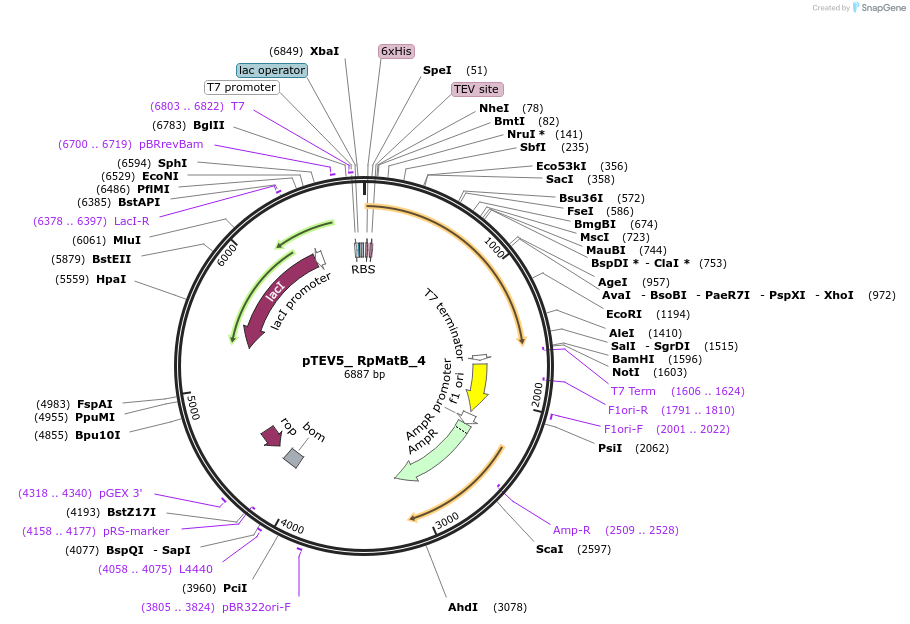pTEV5_ RpMatB_4
(Plasmid
#78208)
-
PurposeExpression of double-cysteine variant of Malonyl-coenzyme A synthetase, RpMatB, as scaffold for ATP biosensor - weak binding
-
Depositing Lab
-
Sequence Information
Ordering
| Item | Catalog # | Description | Quantity | Price (USD) | |
|---|---|---|---|---|---|
| Plasmid | 78208 | Standard format: Plasmid sent in bacteria as agar stab | 1 | $85 | |
Backbone
-
Vector backbonepTEV5
-
Vector typeBacterial Expression
Growth in Bacteria
-
Bacterial Resistance(s)Ampicillin, 100 μg/mL
-
Growth Temperature37°C
-
Growth Strain(s)DH5alpha
-
Growth instructionsuse OverExpress C41(DE3) for protein expression
-
Copy numberHigh Copy
Gene/Insert
-
Gene/Insert namematB (His6 C106A R286C T303A Q457C K488A)
-
SpeciesRhodopseudomonas palustris
-
MutationC106A R286C T303A Q457C K488A
- Promoter T7
-
Tag
/ Fusion Protein
- His6 (N terminal on backbone)
Cloning Information
- Cloning method Restriction Enzyme
- 5′ cloning site Unknown (unknown if destroyed)
- 3′ cloning site Unknown (unknown if destroyed)
- 5′ sequencing primer T7
- 3′ sequencing primer T7 terminal (Common Sequencing Primers)
Resource Information
-
Supplemental Documents
Terms and Licenses
-
Academic/Nonprofit Terms
-
Industry Terms
- Not Available to Industry
Trademarks:
- Zeocin® is an InvivoGen trademark.
Depositor Comments
The plasmid is used to express Malonyl-coenzyme A synthetase from Rhodopseudomonas palustris (RpMatB), containing a His-tag and the mutations C106A, R286C, T303A, Q457C and K488A: (His6/C106A/R286C/Q457C/K488A/T303A)RpMatB.
The protein is modified for use as the scaffold of an ATP biosensor, Rho-RpMatB(T303A). The two cysteine mutations are for label attachment (R286C and Q457C); there is a mutation to prevent enzyme activity (K488A), a mutation to change the wild-type cysteine (C106A), a mutation that weakens ATP binding (T303A) and an N-terminal His-tag to aid purification.
When labelled with two 5-iodoacetamidotetramethylrhodamine (5-IATR) fluorophores, this adduct can be used as an ATP biosensor has a fluorescence intensity change of ~3-fold. With a Kd of ~40 μM, this adduct variant can be used to measure ATP formation in the range of up to ~100 μM, in the presence of millimolar ADP.
These plasmids were created by your colleagues. Please acknowledge the Principal Investigator, cite the article in which the plasmids were described, and include Addgene in the Materials and Methods of your future publications.
-
For your Materials & Methods section:
pTEV5_ RpMatB_4 was a gift from Martin Webb (Addgene plasmid # 78208 ; http://n2t.net/addgene:78208 ; RRID:Addgene_78208) -
For your References section:
Development of a range of fluorescent reagentless biosensors for ATP, based on malonyl-coenzyme A synthetase. Vancraenenbroeck R, Kunzelmann S, Webb MR. PLoS One. 2017 Jun 21;12(6):e0179547. doi: 10.1371/journal.pone.0179547. eCollection 2017. 10.1371/journal.pone.0179547 PubMed 28636641





